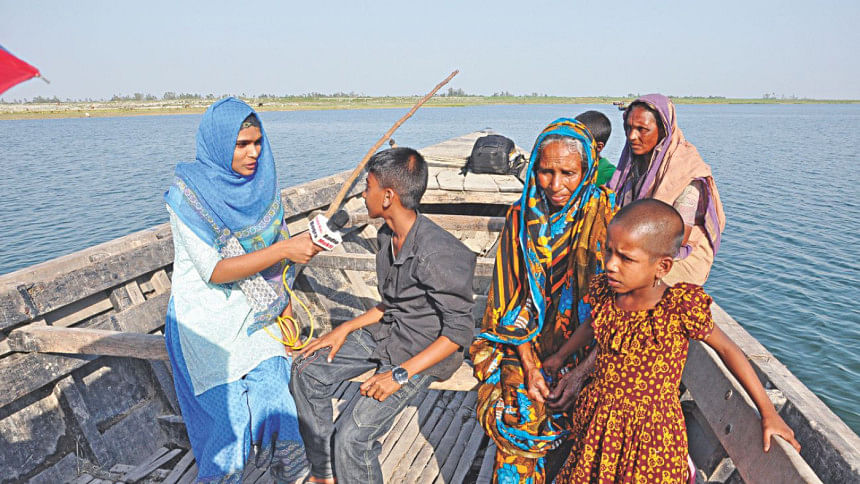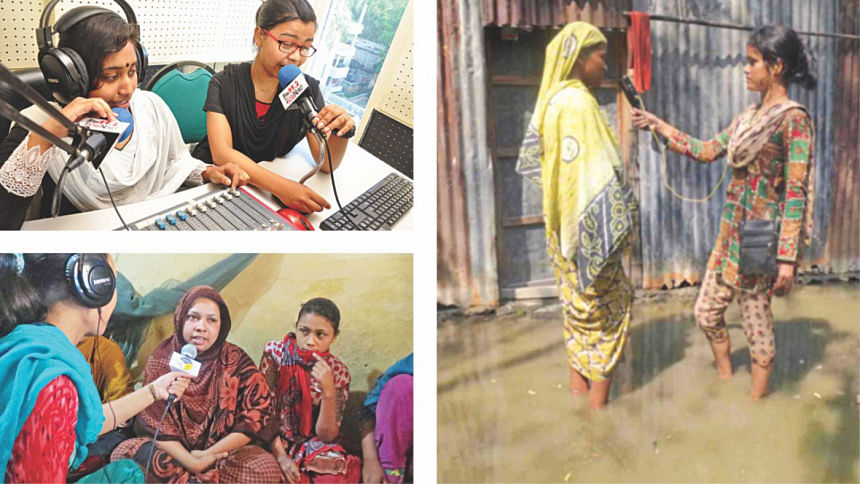Stepping out of the Cocoon

Photos: Courtesy
To encourage more young women into community media and journalism, and to work for the development of rural communities, in 2013, Bangladesh NGO's Network for Radio and Communication (BNNRC), in partnership with Free Press Unlimited (FPU), launched a three month fellowship programme entitled "Youth women in Media and Journalism". In the programme, an experienced mentor trains the attendees how to produce news, reports, features, case study and human profiles.
"We believe that the story of rural underprivileged women can be best depicted by these journalists, as they can bring out their prospects and problems", says AHM Bazlur Rahman, CEO of BNNRC. BNNRC has a special focus on 'Dalit' young women too.
According to a statistics of BNNRC, at present, more than 350 female journalists and volunteers are working in 16 community radios in Bangladesh and they are bringing tremendous success in their own fields. They are mainly covering issues related to women and children- importance of family planning, pre-primary education system, awareness against child marriage, employment of indigenous women in the forest department, violence against women, suicidal tendencies among women, children being victims of pornography, healthcare facilities in local maternity hospitals and many more.
The journey of these promising young women is not smooth at all. Many of them are from very conservative families that don't accept their daughters' participation in media. "I was born and brought up in a family plagued with religious bigotry and superstitions. No woman before me here had stepped out of the house, let alone have a job", says 23 years old Shahrina Sultana Jui, Head of News at Borendra Radio, Naogaon, the one and only female journalist of Naogaon and a fellow of BNNRC's fellowship programme.

"Coming from that family, and becoming a journalist today-- it's like a dream", she adds. She has produced a number of news stories depicting the miseries of the people of her community and has been able to draw the attention of her community, local administration and law enforcers.
Like Shahrina, many female journalists in different community media are struggling to make a change in the male-dominated rural areas. But very often, they are interrupted by the encirclements. "Some girls joined our radio without informing their parents. But when their parents come to know about it, they take them back", says Parvin Nahar, station manager of Radio Jhenuk, Jhenaidah.
Apart from these, there are bigger problems in the working areas. Sometimes they need to go a long way on foot for collecting information, sometimes people don't want to talk to them about sensitive issues, and give wrong information, as they are not aware of their rights. The local administration makes them wait for days for data collection, many a times they don't provide the data at all.
"When I went to cover a report on family planning issues, people of my community didn't even want to talk to me. For them, it's a very private issue to talk about", says Baishakhy Khatun, presently working as a programme host at Bangladesh Betar (started her career at Radio Jhenuk, under the fellowship of BNNRC). "But later on, that programme got the family planning media award from the Ministry of Health and Family Welfare". Apart from these, Baishakhy received a number of national and international awards for her outstanding achievements for Radio Jhenuk.
Conquering all obstacles, rural women journalists are now creating a platform for people of different communities, by picking up the stories of success and sorrow. They demand an indiscriminate environment for performing their duties properly and yearn to move a long way in future with the help of the initiators.

 For all latest news, follow The Daily Star's Google News channel.
For all latest news, follow The Daily Star's Google News channel. 



Comments